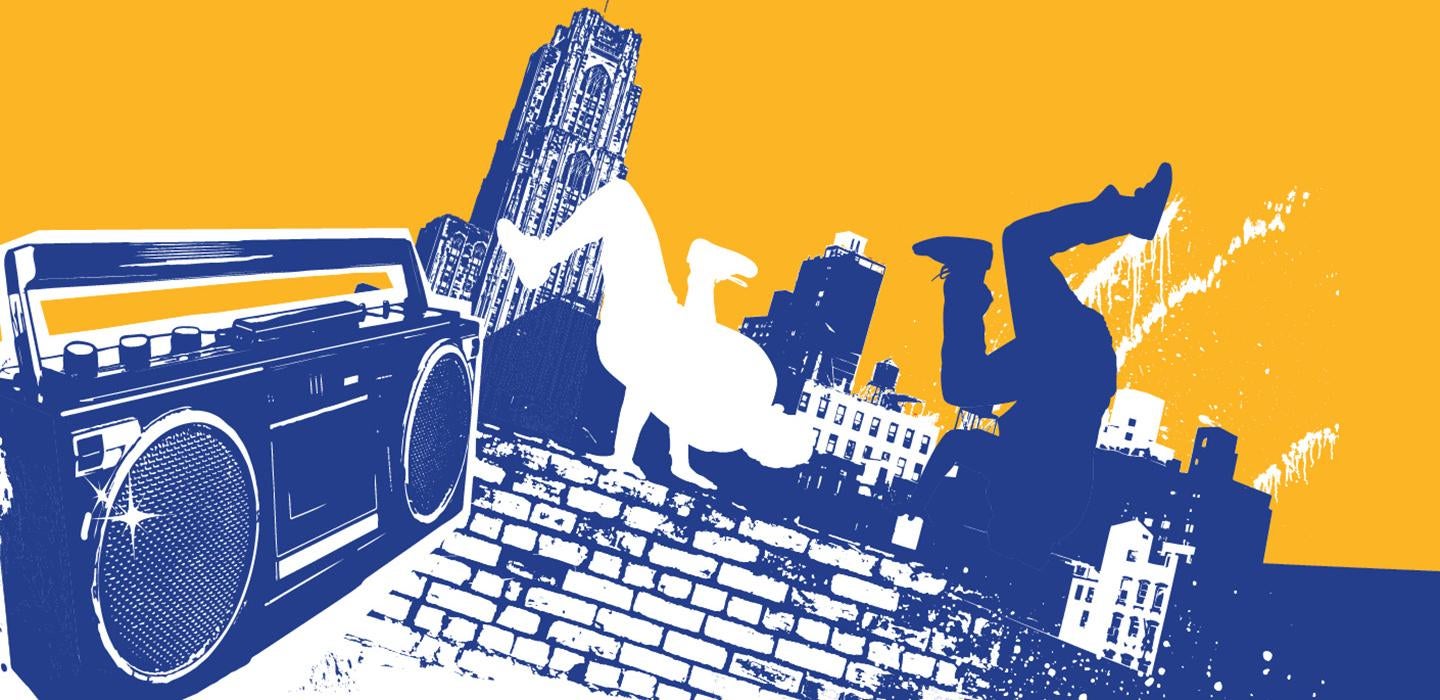
Subscribe to Pittwire Today
Get the most interesting and important stories from the University of Pittsburgh.Hip-hop has come a long way since one Pittsburgh newspaper felt it necessary to include a glossary of terms in a story. (After quoting some Run-DMC lyrics in a 1986 article, an unidentified editor inserted a note to explain to readers that “‘ill-est’… in this context means ‘coolest,’ or, ‘satisfactory.’”)
Just as social critics were outraged by jazz music in the 1920s and rock ‘n’ roll in the 1950s, hip-hop convulsed and confounded observers when it emerged from American cities in the 1970s and ’80s. Those musical forms eventually went mainstream and resonated with audiences around the world just as hip-hop is also now a major cultural and economic force — and a subject for nostalgia.
The University of Pittsburgh and 1Hood Media will mark the 50th anniversary of the emergence of hip-hop during the summer of 1973 with a special event at 7 p.m. June 15 at the Blaxk Box Theater, 460 Melwood Ave., in Pittsburgh’s Oakland neighborhood.
“This Thing We Call Hip-Hop” will bring together artists and academics from across the Pittsburgh area to discuss city’s influence on the genre and the music’s importance to three generations of Western Pennsylvania residents. Video snippets recorded with Pitt faculty, staff and alumni about their own experiences with hip-hop music also will be included.
Artists scheduled to appear include Fedd the God, Hardo, Paradise Gray, SpeciàlK and Dr. Starkes, the Rapping Principal. The discussion will be hosted by Chantel Petersen, known better as “PopChanny.”
The event is free, but tickets should be reserved in advance.
In addition to the milestone anniversary, “This Thing We Call Hip-Hop” is also tied to the University’s celebration of the Juneteenth weekend. “Hip-hop was born as a rebellious genre whose goal was never to be global, but instead to be a method of expression for the Black community,” said Chance Wideman, director of equity and inclusion programs in the University’s Office for Equity, Diversity, and Inclusion, who is helping organize the event. “DJ Kool Herc and many other pioneers of hip-hop created a genre that thrived on self-expression, rebellion and creativity.”
He added: “Unfortunately, race did — and still does — play a major role in how art is consumed, and it wasn’t until middle America got hold of hip-hop in the 1990s that it really started to go global. Whether you’re a fan of the music or not, hip-hop is forever ingrained in our culture, and I hope people can learn more about the how and why of hip-hop.”
Clyde Wilson Pickett, the University’s vice chancellor for equity, diversity and inclusion and chief diversity officer, said it’s been interesting to watch the progression and globalization of hip-hop during his lifetime.
“Hip-hop has been a quintessential part of my life,” Pickett said. “Certainly, as a genre of music, it’s been prominent, but so too have its cultural elements and impact on social exchange. I can personally remember when it was not widely accepted by the mainstream. Over time, we saw it progress, and as it passed from generation to generation, it became more accepted and popularized. And much like what happened to rock and roll and jazz, it became the pre-eminent form of popular music for a generation. It’s also important to note that as it has shifted in many ways, it’s also become commercialized.”
Wideman hopes people who attend the event will leave with a greater appreciation for the role hip-hop music has played in allowing young people — especially Black Americans — to express themselves creatively and give voice to ongoing social justice concerns, including poverty, joblessness and the community’s relationship with mostly white institutions such as the police.
“I also want people to gain an understanding of what role Pittsburgh and the University have played, and how we can continue to advance, preserve and interpret hip-hop music and culture,” Wideman said.
— Jason Togyer, illustration by Amy Kleebank


